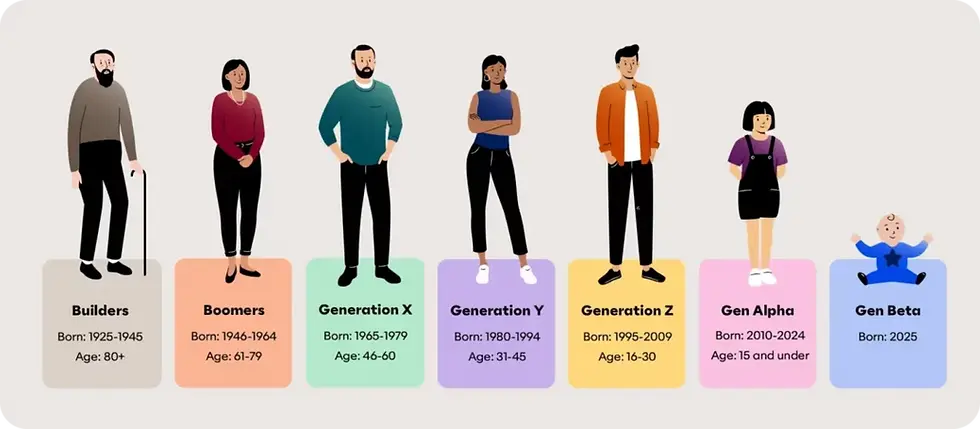Generations Timeline 2025: Birth Years and Key Traits
- Abhinand PS
.jpg/v1/fill/w_320,h_320/file.jpg)
- Aug 15
- 2 min read
Introduction: Understanding Generations in 2025
Generations are more than just age groups—they define cultural shifts, societal values, and consumer trends that impact everything from marketing to workplace dynamics. As of 2025, naming and defining generations helps us understand the unique experiences shaping each group's worldview.

This blog post offers a detailed, year-by-year guide to generational cohorts recognized in 2025, including their birth years, defining traits, and social significance. Whether you're a parent, educator, marketer, or curious reader, this guide helps you navigate generational differences with clarity.
Generational Timeline and Their Birth Years in 2025
Generation Name | Birth Years | Current Age in 2025 | Key Characteristics |
Greatest Generation | 1901-1927 | 98-124 | Resilience, shaped by wars & economic hardship |
Silent Generation | 1928-1945 | 80-97 | Traditional values, disciplined, loyal |
Baby Boomers I | 1946-1954 | 71-79 | Post-war optimism, work ethic, cultural impact |
Baby Boomers II (Generation Jones) | 1955-1964 | 61-70 | Transitional boomers, experienced social change |
Generation X | 1965-1980 | 45-60 | Independent, tech-adaptation, skeptical mindset |
Millennials (Gen Y) | 1981-1996 | 29-44 | Digital natives, diverse, value experiences |
Generation Z | 1997-2012 | 13-28 | Tech-savvy, socially aware, pragmatic |
Generation Alpha | 2010-2024 | 1-15 | Born into technology, family focus, diverse |
Generation Beta | 2025-2039 | 0-? | Emerging generation, expected tech integration |
What Defines Each Generation?
The Boomers and Silent Generations
Shaped by historical events like World War II and the post-war boom.
Values include hard work, loyalty, and traditional family roles.
Gen X and Millennials
Generation X bridged analog and digital eras, known for independence.
Millennials grew up with the internet, prioritizing social justice and experiences.
Gen Z and Generation Alpha
Gen Z is known for activism, digital fluency, and pragmatic views shaped by a global pandemic.
Generation Alpha are today’s youngest, surrounded by technology and global connectivity from birth.
Introducing Generation Beta
Starting in 2025, Generation Beta will grow up amid advanced AI, virtual reality, and sustainability challenges.
This generation is predicted to be highly tech-integrated and diversity-focused, adapting to rapid societal changes.
Key Generation Trends in 2025
Growing importance of digital literacy across all generations
Emphasis on sustainability and climate awareness among younger cohorts
Changing family structures and increased value placed on diversity and inclusion
Shifts in work culture driven by generational preferences for flexibility
FAQ About Generations in 2025
1. What generation is a person born in 2000 classified as?They belong to Generation Z, born between 1997 and 2012.
2. Why is the new generation called Generation Beta?It represents children born starting in 2025, expected to grow up with immersive technologies and strong values of inclusion and sustainability.
3. How does understanding generations help businesses?Knowing generational traits allows businesses to tailor marketing, products, and communication to resonate with specific audience segments effectively.
Conclusion
The generational landscape of 2025 spans from the resilient Greatest Generation to the emerging Generation Beta, each shaped by unique social and technological forces. This generational knowledge provides valuable insights for navigating relationships, business strategies, and social trends.
To dive deeper into digital strategies and generational marketing for 2025, explore Abhinandps.com for expert guidance and practical resources.



Comments